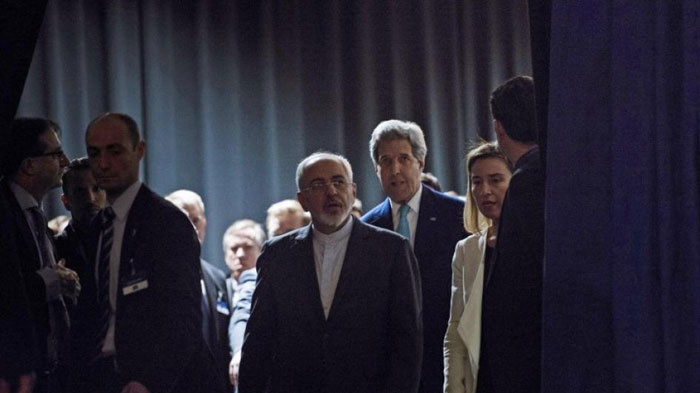Dignity and a Good Deal

Various historical and cultural factors underlie post-revolutionary Iranians to view rapprochement with the West skeptically. The term ‘reconciliation’ itself has for long had a negative connotation in Iran’s political jargon, associated with weakness and simplicity. Although Reformist and pragmatist politicians have long cast away their revolutionary zeal and have been calling for détente with the West, the hard core of the Islamic Republic has kept the fire burning.
The lengthy talks between Iran and six world powers (five veto-wielding members of the UN Security Council plus Germany), has shown a brief respite in what is considered by conservatives as a large-scale, ‘civilizational confrontation’ between the Islamic Republic and the West, as the two camps follow inherently different worldviews.
In evaluation of the negotiations and the Joint Comprehensive Plan of Action (JCPOA), the key term of the revolutionary discourse in foreign policy are still frequently employed: dignity, red lines and national interest. (The latter two are comprehensible by foreign observers, yet they may have difficulty contextualizing the term ‘dignity’ and its stature in Iranian political discourse.) As once piece in the conservative newspaper of Resalat reads: “red lines are beyond material loss and gain; they protect the spiritual capital of a nation; they protect the dignity, honor and power of a nation. Once cannot expose them to common tradeoffs.”
Unlike past, conservatives and hardliners have not rejected negotiation with world powers categorically, if we take their words at face value; but repeatedly called for a ‘good deal’. The Supreme Leader Ayatollah Khamenei has conditionally backed the negotiations, though reserving skepticism towards foreign powers. In an interview with Tasnim, IRGC Commander Mohammad-Ali Jafari stated that “there is not a single official in the Islamic Republic who is against negotiations and a good deal”.
But what are the features of a good deal according to conservatives?
Not surprisingly, the first and foremost condition set by conservative figures is the “termination” of sanctions. Indeed, this has been the main staple of criticism against the JCPOA: it does not set a single-phase, immediate termination of sanctions that have hurt Iran’s economy; termination of sanctions hinges upon fulfillment of certain commitments by Iran, and IAEA’s subsequent approval. The UN offshoot is viewed suspiciously among Iranian officials, believed to act as a pawn in the hands of the US and other Western powers. Critics are also particularly sensitive about the ‘supensive’ nature of sanctions, hence the possibility of their immediate return.
According to Fazollah Mousavi, former conservative member of the parliament: “sanctions should be collectively abrogated at the first day after the deal is finalized.” Mahdi Mohammadi, former nuclear negotiator in Saeed Jalili’s team, and leading Principlist authority on nuclear talks also believes that “a good deal is a deal that … terminates all sanctions immediately after the final signing” by parties.
Some requested provisions look more like wishful thinking however, like the ones demanded by hardline newspaper Kayhan that “all nuclear and non-nuclear sanctions be annulled collectively and at once” and “abrogation of sanctions be not hinged upon Iran’s fulfillment of its commitments.”
Maintenance and further development of Iran’s nuclear program is also considered as an inseparable element of a good deal by the conservatives. Unlike some Reformist figures who use a material loss and gain calculus for the nuclear issue, the conservatives attach an endeared position to nuclear know-how in their vision of ideal Islamic statecraft. Advancement in nuclear program has become the ultimate proof that for progress, countries do not need to ‘beg’ for assistance from advanced, imperialist powers; that is, under the major strategy of self-reliance scientific progress can be achieved independently. Strong opposition has been demonstrated towards any restriction of Iran’s nuclear program, especially its R&D developments. As Ayatollah Khamenei stated in one speech: “since the beginning [of the nuclear talks], we have said that we want the unjust sanctions to be lifted; of course, in return we are ready to give some things, provided that our nuclear industry will not stop or be damaged”.
Conservatives, in this particular case, see the West’s efforts to curb Iran’s nuclear program as part of the larger narrative of Western attempt to bolster their grip of hegemony over science and try to limit certain high-tech tools to a special club, with the fewer members the better. Iran has insisted that nuclear program, and nuclear enrichment, is an inalienable right which cannot be taken away by any means.
Banning inspection and access to Iran’s military centers and other sensitive sites are also another major feature of a good deal in the eyes of Iranian conservatives. A piece in hardline news website Rajanews argues: “military inspection which can be demanded by the West according to the Additional Protocol and the unresolved issue of PMD [possible military dimension] are all evidence that red lines have been breached, [our] dignity and pride has been violated and hence a ‘bad deal’ has been made”.
In his recent speech, Ayatollah Khamenei, contrary to the jubilant tone of Hassan Rouhani’s cabinet, said that the fate of the deal is not clear yet, since it has been ratified neither by the US Congress nor the Iranian parliament. Despite much sound and fury by the hardliners of the Iranian parliament, it is unlikely that they throw a wrench at the deal; the larger confrontation with pro-deal forces will come afterwards, when the time comes for implementation and the details gain more importance.

